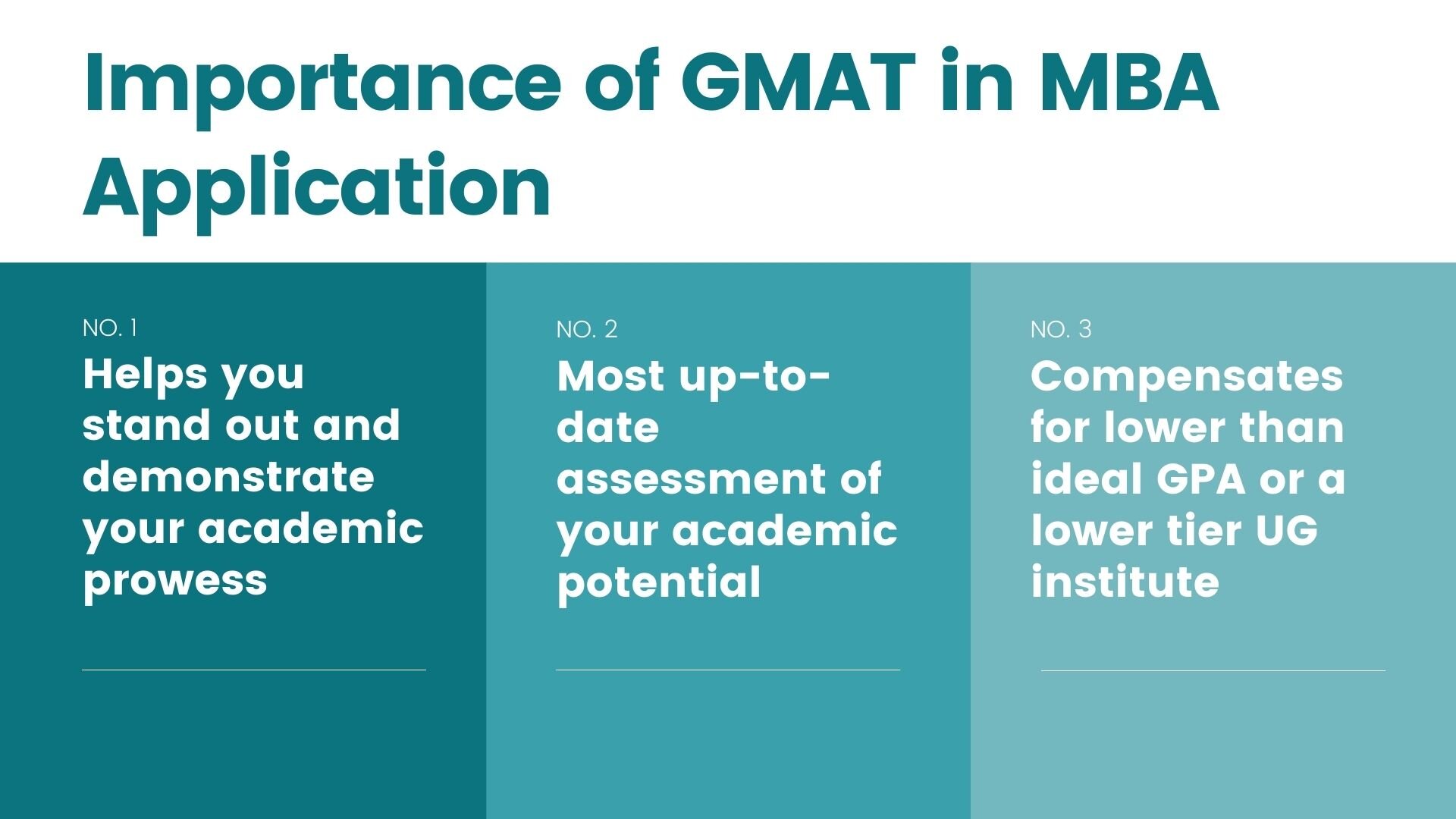How Important Is GMAT For MBA & How to address A Low GMAT Score

The GMAT serves as the initial stride in your MBA journey, providing a platform to demonstrate your analytical and quantitative aptitude, crucial for excelling in demanding fields like finance, consulting, and tech. Accepted by over 7000 business and management programs worldwide, it’s the favored test for MBA admissions at top business schools. Understanding how to address a low GMAT score is key to showcasing your strengths and optimizing your application for these competitive programs.
As an MBA aspirant, you’ve probably come across some questions:
Here is the Snapshot of the article:
This article will address all of your concerns regarding low GMAT scores and guide you through the process. So, stay tuned with us.
How Important Is Your GMAT for MBA Application
The GMAT is one of those examinations that will have a long-term impact on your professional life. Not just business schools but companies recruiting from these schools will also assess your GMAT score for MBA to evaluate your overall competency for the jobs.

Here are a few key points that highlight the importance of GMAT score for MBA applications:
- The GMAT score for MBA is a critical component that business schools use to inform admission decisions, playing a pivotal role in differentiating you during the admission process and allowing you to highlight your academic capabilities. Knowing how to address a low GMAT score is essential in building a compelling case for your admission, demonstrating your determination and ability to overcome challenges.
- The GMAT score for MBA represents the most up-to-date assessment of your academic potential in your application process.
- A robust GMAT score for MBA can act as compensation for a less-than-ideal GPA or attendance at a lower-tier undergraduate institute. Conversely, if your GMAT score is on the lower side, the school must find convincing evidence of your academic capabilities and professional excellence to consider your admission.
Regarding the importance of a GMAT score for an MBA in determining your chances to a target school, a good GMAT score complements your MBA applications well and presents a strong case of your candidature. So, a low GMAT score can only have a limited impact. Later in the article, you will see some low GMAT success stories of how our successful candidates have gone into top-notch business schools like INSEAD and LBS, a supposedly “low GMAT” score.
What’s a Good GMAT Score

A strong GMAT score is crucial for showcasing your academic potential and carries importance beyond the application process. While what constitutes a good GMAT score can vary, comparing your score with the average at your target school can offer a benchmark. Understanding how to address a low GMAT score is vital, as it allows you to strategize effectively and enhance your overall application, demonstrating your capability to excel despite challenges.
Want to pursue an MBA but not sure if your profile fits?
Talk to our Profile Experts to know your chances for a top MBA Program.
GET A FREE PROFILE ANALYSISWhat Does a Low GMAT Score Mean
A low GMAT score, typically below 550, can impact your chances at top business schools where average scores are above 720. However, it doesn’t eliminate your options. Admissions committees often take a holistic approach, valuing work experience, recommendations, and personal essays alongside test scores. Schools such as the University of St. Gallen and Purdue University accept students with scores of 650 or lower, emphasizing the broader evaluation criteria. Additionally, retaking the GMAT to improve your score is encouraged and seen as a sign of perseverance and commitment
What Is the Lowest Acceptable GMAT Score
Regarding the GMAT score for MBA, the range spans from 200 to 800, with most business colleges not setting a minimum cut-off. To assess the adequacy of your GMAT score for MBA, compare it against the average or the middle 80% score range at your target school. Falling below this range indicates a low GMAT score. It’s crucial to know how to address a low GMAT score, as this can significantly enhance your application strategy and increase your chances of admission by demonstrating your ability to improve and succeed.
Example of a Low GMAT Score
For a deeper understanding of the implications of a low GMAT score, consider this example: The middle 80% range of GMAT scores for INSEAD MBA is 670-750. Likewise, for MIT SLOAN, the middle 80% score range of GMAT scores is 690-760. Therefore, examining the class profiles of various schools allows you to ascertain the average GMAT score for MBA and the middle 80% range of their respective classes.
While a low GMAT score for MBA compared to your expectations or the school’s average can be disheartening, fixating on it won’t improve the situation. Many applicants with low GMAT scores are uncertain about their eligibility for their target business schools. However, it’s crucial to shift focus from the problem to the solution by learning how to address a low GMAT score. This approach can not only enhance your application but also potentially open doors to discussions about your perseverance and capability to tackle challenges, which are valuable traits for business school candidates.

One of our applicants was in a similar situation with a low GMAT score. Still, she put together an outstanding application and nailed her interview to make it to ROTMAN, with a CAD scholarship of 30,000. Despite coming from an overrepresented pool with a low GMAT score of 670! Are you amazed? Shocked? This is just one in many low GMAT score success stories of people who got into the best colleges despite having a low GMAT score.
For a Low GMAT Score, You Have Two Options Mainly
Option 1: If you feel you want to increase the number of opportunities of B-school applications after a low GMAT score, Retake the GMAT exam until you reach your targeted score
Option 2: If you don’t want to reapply after a low GMAT score, Work on each aspect of your business school application very carefully and apply with the same low GMAT score.
If you choose option 1, we wish you the best of luck, and if you select option 2, grab a pen and paper and start making notes on how you can overcome your low GMAT score and let us help you become a case of low GMAT score success stories! 😉
How Do You Justify a Low GMAT Score

Don’t view yourself merely as a number or assess your worth by a low GMAT score; you embody more than your GMAT score for MBA. Indeed, the GMAT score is just one element of your entire application, highlighting the importance of understanding how to address a low GMAT score. During the application review, the admissions committee evaluates every component meticulously. Business schools seek diversity in their classes, not just applicants with perfect 780 GMAT scores.
Recognizing how to address a low GMAT score can guide you to emphasize other strengths, balancing out your application and illustrating your broader potential to the admissions committee. They need people who can bring different ideas and perspectives to their classes, are employable to top companies, and significantly contribute to their classes.
So thinking about your low GMAT score from this angle will help you put together your entire application as a whole instead of worrying about your low GMAT score.
However, you could do a couple of things to justify your low GMAT score.
These are five key points that will help you balance your low GMAT score.
1) LETTERS OF RECOMMENDATION
- Firstly, remember that various programs may have distinct requirements for recommendation letters, so be sure to review the admissions section for your application. This could be a crucial factor in excelling in your application, especially after a low GMAT score, highlighting the importance of understanding how to address a low GMAT score effectively.
- The admissions committee seeks a recommender who has collaborated with you, knows you personally, and can recount real-life stories and anecdotes that provide substantial insights into your personality. This nuanced approach allows the committee to see beyond your low GMAT score and assess your broader potential.
- Your Letters of Recommendation (LORs) must offer admission officers valuable insights about your experiences, achievements, contributions, and talents to create a positive portrayal, aiding your application in overcoming the hurdle of a low GMAT score. Knowing how to address a low GMAT score in your application context, including in your LORs, can significantly enhance your overall presentation to the admissions committee.
- LORs from non-profit organizations with which you have collaborated can be instrumental in offsetting a low GMAT score. Generally, universities extend opportunities to applicants with low GMAT scores, particularly when supported by LORs from non-profit organizations. This demonstrates qualities such as social contribution, leadership, and empathy—attributes highly valued by universities, often carrying more weight than a low GMAT score.
2) RESUME
Aside from your recommendations and low GMAT score, the quality of your work serves as a testament to your flourishing and illustrious career. Your resume is the ideal platform to showcase achievements such as promotions, international experience, and leadership, all of which speak louder than a low GMAT score.
Are you wondering how you justify a low GMAT score? This is how
Recall the moments when you held a leadership role, steering a team of ten or more to success in your team’s most significant project and overseeing its successful completion. Highlighting such impactful experiences in your resume can effectively mitigate the impact of a low GMAT score. Delve into instances where you proactively organized knowledge management sessions or assumed additional responsibilities beyond your primary role. Trust us, every effort contributes to diverting attention from your low GMAT score. Your resume is the canvas for narrating your professional story and showcasing your most remarkable achievements.
3) Essay: How to Explain a Low GMAT Score in Your Essays

The key to focusing away from a low GMAT score here is to emphasize your distinctive personality and life experiences. It aims to demonstrate who you are as an individual rather than giving yourself a tag of your GMAT score.
Consider yourself a product, and write down all of your USPs. Introspect over questions such as;
- Where are you in your career right now?
- Where do you want to go?
- Do you need an MBA to reach there?
- How can the school assist you in getting there?
- Why have you picked this school at this point in your academic and professional career?
- Why do you think you are more than your low GMAT score?
TWO TIPS FOR CONCEALING YOUR LOW GMAT SCORE –
- First, Convey what you are passionate about as the admission committee is keen to know what excites you and why they should accept you as an engaging, dynamic, vital person to their program. Concentrate on the particular role you aspire to undertake, maintaining realism in your goals if feasible, and candidly addressing your low GMAT score. It is crucial to genuinely persuade the admissions committee, portraying a clear understanding of the program despite the low GMAT score. Illustrate how you can enhance your peers’ learning experiences in ways beyond their imagination.
- Second, if any of your schools offer an optional essay allowing additional information, seize this chance to thoroughly address your low GMAT score. Ultimately, assure the admission committee that your low GMAT score is not indicative of your fundamental academic skills.
How do you explain the low GMAT in an optional essay? First, briefly describe the steps you took to prepare for the GMAT exam, as well as any obstacles that prevented you from having more time to study for the GMAT. Then, to strengthen your candidacy and showcase your capabilities, draw their attention to the supplementary coursework you have done. Supplemental coursework will help overshadow your low GMAT score.
4) Interview: How to Answer the Questions About Your Low GMAT Score
If you’ve received an invitation for an interview, you’re on the verge of success! This signals an opportunity to shift focus away from your low GMAT score and make a lasting impression on the admissions committee (adcoms) members. This is your moment to shine, where you realize your worth goes beyond your low GMAT score. During the interview, the panel members are eager to learn about you—your aspirations, goals, why you want to pursue an MBA, and various topics unrelated to your GMAT score. Therefore, present your best self on this day. Instead of worrying about your low GMAT score, embrace the fact that the adcoms have moved past it by inviting you for an interview, indicating their interest in knowing more about you.
5) Supplement Course Work for a Low GMAT Score Applicant
The GMAT score for MBA serves as a reliable indicator of your academic skills and ability to thrive in the MBA course. Consider undertaking and excelling in additional coursework, particularly in subjects like statistics, economics, calculus, or accounting. This effort showcases your capacity to navigate the quantitative rigor of business school, mitigating the impact of a low GMAT score. There are alternative strategies to offset a low GMAT score and demonstrate these capabilities, including maintaining a high undergraduate GPA or completing online/offline courses demanding a high level of quantitative competency. Possessing a postgraduate degree (e.g., MS, M Tech, etc.) or having completed undergraduate/postgraduate studies at an international university can significantly enhance your profile, diverting attention from your low GMAT score.
Low GMAT Score Success Stories- Journey to ROTMAN School of Management

In this article, we are speaking to a chemical engineer who supposedly has a regular profile of an Indian engineer with a “low GMAT score” of 670 and still cracked the admissions of one of the best business schools in Canada (Rotman) to embark on his journey for her double MBA.
Final Takeaway
The GMAT score for MBA constitutes just one aspect of the application. For example, a low GMAT score can be offset by strong performance in academic coursework, substantial work experience and progression, and other factors like extracurricular activities, leadership skills, and cultural fit. These additional qualities provide a competitive advantage, allowing you to excel in the application process despite a low GMAT score.
Now that you have insights on overcoming a low GMAT score, it’s time to embark on crafting your application. If you require assistance with brainstorming your storyline, personalizing impactful essays, highlighting achievements on your resume, or addressing questions about the low GMAT score, we are here to support you. Stop hesitating and apply to your dream schools because you are truly much more than your GMAT score!
You can look into top mba programs which have waived GMAT score and their respective criteria.
Frequently Asked Questions
1.
How important is the GMAT for MBA admissions
The GMAT is an important factor in MBA admissions, as it helps schools assess your quantitative, analytical, and verbal skills. However, it is just one part of the overall application. Admissions committees also consider work experience, academic background, leadership potential, essays, and recommendation letters. A strong performance in other areas can sometimes compensate for a lower GMAT score
2.
How can I address a low GMAT score in my MBA application
If your GMAT score is lower than the program’s average, you can strengthen your application by highlighting other areas where you excel, such as leadership achievements, career growth, or academic accomplishments. Consider including an optional essay to explain any extenuating circumstances and demonstrate your readiness for the program through certifications, additional coursework, or strong professional success




Leave a Reply